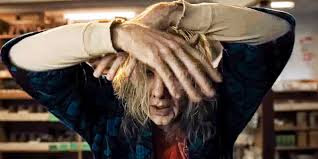Format: DVD from Sycamore Public Library on basement television.
A friend of mine saw Longlegs in the theater, and when I asked her about it, she told me she had to see it again. Essentially, she said that she and her group had an edible and then sat in the front row of the theater, which made the whole thing something of a surreal experience, and she’s not sure how much of what she watched is actually accurate to the film. Well, for what it’s worth, I watched Longlegs stone cold sober, and I’m not sure what to make of it, either, something that she found very comforting when I told her.
Longlegs is, to this point, the latest film from Osgood Perkins, although his next film comes out in a couple of weeks. It’s also, as of now, his best-reviewed film. Perkins makes unusual movies, and this certainly fits that pattern. This is a serial killer movie, but it’s also a supernatural horror movie, and through most of it, it’s almost impossible to know what is going to happen next.
FBI agent Lee Harker (Maika Monroe), who might be clairvoyant, is assigned to a series of murder/suicide cases in Oregon. Normally, murder/suicides don’t have anything to do with each other, but these are all connected. In every case, the husband has slaughtered his family before killing himself, leaving behind a note signed “Longlegs.” In each case, the handwriting appears to be the same, and matches none of the handwriting of the dead folks. A stranger connection is that in each case, the family had a nine-year-old daughter born on the 14th of the month. In each case, the murder/suicide occurred within six days, before or after, that ninth birthday.
As the story unfolds, we learn a few things about Agent Harker, and as the case gets deeper and deeper, we start to learn of her potential connection to the Longlegs killer. And, naturally things start to fall into place when they capture someone who fits the profile of the Longlegs killer (Nicolas Cage).
Cage is virtually unrecognizable in the makeup as Longlegs. It’s a unique performance, one that walks a very tight line between pure camp and insanity. It is possibly a brilliant performance, genuinely so, in large part because it’s almost a parody of someone trying to create a really crazy, memorable persona. Cage is only on screen for a few minutes total—around 10 minutes for the entire film—and yet he remains the most memorable part of the film because of how clearly deranged the performance is.
The point of Longlegs is to unsettle the audience as much as possible. The Nic Cage character is certainly a part of that, but there’s more to it as well. At one point, Harker pays a visit to Carrie Anne Camera (Kiernan Shipka) in a mental institution. Carrie Anne is the only known survivor of one of Longlegs’s murders, and she has completely lost her mind, in large part due to some bizarre allegiance to the killer. Her monologue, during which she says she’d kill herself if the killer told her to and just as happily gut Harker if told, is a truly unsettling few minutes of screentime.
While there’s a lot to like with Longlegs, there are some real issues with it. As everything starts to tie together to come to a conclusion, more and more of Harker’s past is revealed, specifically her connection to the Longlegs killer. This also ties in to her relationship to her boss, Agent Carter (Blair Underwood). There are only a few ways that all of this can legitimately tie together, and it’s not really hidden. All of the clues, or at least most of them, are dropped early enough in the film that a good percentage of the ending is guessable. I can’t say that I got the complete end of the film, but I did guess 80% or so of it half an hour or more before we got there.
That’s not always a problem, of course. Genre tropes are what they are, after all. But it is a significant problem in a film where a good deal of the narrative is spent specifically attempting to keep the audience off-balance and unsure of what is going to happen next.
I’m not sure if Longlegs is the kind of movie that you actually enjoy. It’s an interesting vision, and one that might be worth a second watch. There’s a lot here that seems extraneous, though. Why make Harker possibly psychic, for instance? This seems like something to be there just to be there. The film maybe gets a little leverage out of this, it’s ultimately kind of unnecessary and there just for additional weirdness.
Ultimately, it’s fine, but it feels weirder than it does good.
Why to watch Longlegs: Nic Cage is a singular experience.
Why not to watch: There’s a good chance you won’t know how you feel about it.


This film has been in my watchlist for months as I really hope to see it during Halloween season.
ReplyDeleteOz Perkins has some talent. I think he's still getting there as a director, but he's not quite fully where he needs to be as a director.
DeleteAs it approached it's conclusion, I felt weird out. The hints may have been there, but the resolution still felt contrived with a lot of threads unresolved, unexplained or simply unnecessary. I agree that the clairvoyant element was ultimately unnecessary, but far in I felt certain it would be important.
ReplyDeleteI think "contrived" is the right word for this. There's a lot to like, but there's a lot that feels like it doesn't belong.
Delete